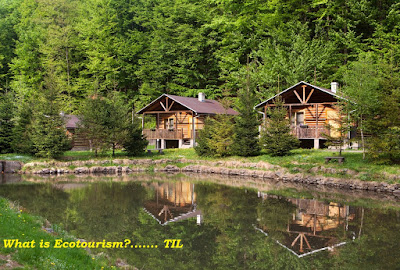Ecotourism is now described as "responsible travel to natural
areas that retains the environment, maintains the well-being of the natives,
and includes presentation and education". Education is meant to be
comprehensive of both staff and visitors.
Principles of Ecotourism
Ecotourism is about working together preservation, areas, and
maintainable travel. This means that those who employ, take part in and market Ecotourism
activities should follow the following Ecotourism principles:
- Minimize physical, public, behavior, and psychological effects.
- Build ecological and social awareness and respect.
- Provide positive encounters for both guests and serves.
- Provide direct economical advantages for preservation.
- Design, construct and operate low-impact facilities.
The pros and cons of eco
travel
In order to truly understand Ecotourism and all of its worker
benefits and drawbacks it is necessary to do some research. This page offers
presenting the subject along with several hyperlinks to more information.
The
standard explanations below have been tailored and resolved from widely used
travel market terms. Some of back links are to articles that help further
determine Ecotourism, some advertising, some crucial, but all are thought
revealing and useful.
 |
| Traveler Rest Areas |
Responsible traveler's
purchasing power
The objective of this area of Untamed Path's website is neither to
promote nor decrease the value of Ecotourism but rather to discover it as an
idea and to help make better advised tourists who ask lots of concerns before,
during and after their journey.
Knowledgeable tourists choose their books,
travel companies and resorts from a position expertise. This buying power can
be the power behind adverse or positive effects on the locations we visit. Increased tourism to delicate natural places without appropriate
planning and management can endanger the reliability of environments and
regional societies.
The increase of visitors environmentally delicate places
can lead to significant ecological deterioration. Likewise, regional
neighborhoods and natural societies can be injured in numerous ways by an
increase of foreign guests and prosperity.
Additionally, variations in climate,
exchange rates, and governmental and social conditions can make over-dependence
upon tourism a risky business.On the other hand, this same development makes important
possibilities for both preservation and local neighborhoods.
Ecotourism can
provide much-needed earnings for the security of nature and other natural
places -- earnings that might not be available from other resources.Furthermore, Ecotourism can provide a practical financial growth substitute
for local neighborhoods with few other income-generating options.
Moreover,
Ecotourism can increase the level to train and learning and activism among
tourists, making them more passionate and effective providers of preservation.
Why is Ecotourism
important?
Ecotourism is a growing section of the international
travel and leisure industry that is making significant positive efforts to the
ecological, social, social and financial well-being of locations and native
neighborhoods around the globe.
Offering market-linked long-term solutions, Ecotourism provides
efficient financial rewards for preserving and improving bio-cultural variety
and helps secure the natural and social culture of our wonderful planet. By
increasing capacity building opportunities, Ecotourism is also an efficient vehicle for
strengthening regional neighborhoods around the globe to battle against
hardship and to achieve maintainable development.
EmoticonEmoticon